Hiring a pricing analyst is a strategic move that can significantly impact your company's bottom line. Many organizations underestimate the complexity of this role, often conflating it with general financial analysis. However, a skilled pricing analyst brings a unique blend of data interpretation, market insight, and strategic thinking that can drive revenue optimization and competitive positioning.
This guide will walk you through the process of identifying, attracting, and selecting the ideal pricing analyst for your team. We'll cover everything from crafting an effective job description to conducting targeted interviews and assessments. For a deeper dive into the specific skills to look for, check out our comprehensive list of skills required for a pricing analyst.
Table of contents
Why Hire a Pricing Analyst?
Hiring a pricing analyst can be a game-changer for businesses struggling with pricing strategies. If you're facing challenges like low profit margins, customer pushback on prices, or difficulty competing in your market, a pricing analyst could be the solution.
A skilled pricing analyst can help you:
- Optimize your pricing structure
- Analyze market trends and competitor pricing
- Develop data-driven pricing strategies
Before committing to a full-time hire, consider your company's size and needs. For smaller businesses or those new to pricing analysis, starting with a consultant might be wise. As your pricing needs grow more complex, bringing on a dedicated pricing analyst can provide long-term value and tailored strategies for your business.
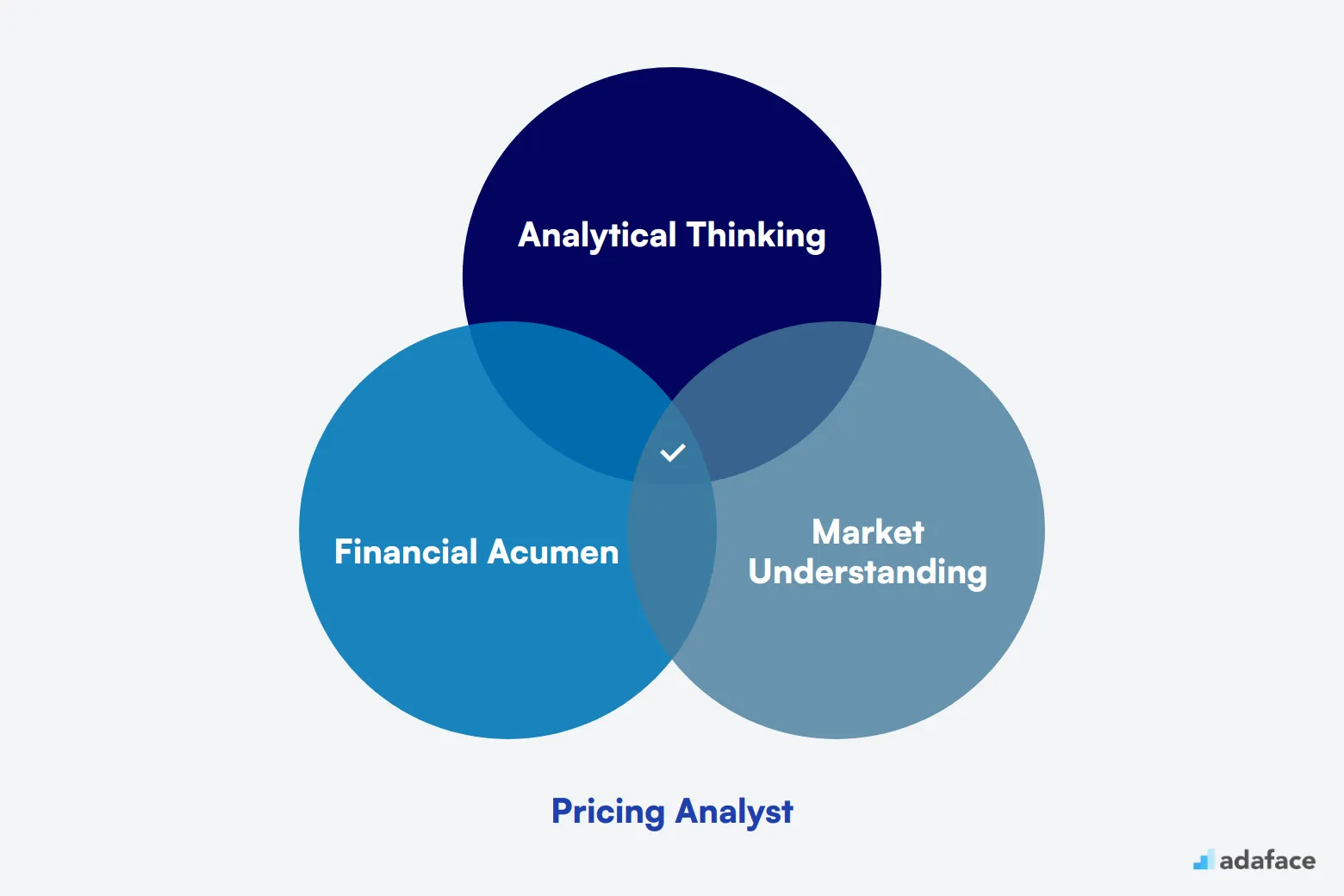
Pricing Analyst Hiring Process
Hiring a Pricing Analyst typically takes around 6-8 weeks. This timeline ensures a thorough evaluation of candidates while maintaining a clear focus on the essential skills required for the role.
- Start by crafting a well-defined job description that highlights the key responsibilities and qualifications. Post it on relevant job boards and platforms.
- Expect to receive a influx of resumes within the first week. Review them carefully to shortlist candidates based on experience and skill sets.
- After shortlisting, conduct skill assessments to evaluate their analytical capabilities. This can include practical tests or case studies tailored to pricing analysis.
- Move on to the interview stage for the top candidates. Assess their problem-solving skills, understanding of pricing strategies, and cultural fit.
- Finally, make an offer to the chosen candidate. The entire hiring process, from job posting to the offer stage, can vary in length based on your urgency and the number of applicants.
In summary, the hiring process for a Pricing Analyst involves clear steps from job posting to selection. With careful planning, you can find the right candidate efficiently. Now, let's explore each step in detail, including handy checklists and resources for your hiring journey.
Key Skills and Qualifications to Seek in a Pricing Analyst
Hiring a Pricing Analyst requires a well-defined candidate profile to ensure you find the right fit for your organization. One common mistake is underestimating the importance of specific analytical skills and experience in financial analysis. Distinguishing between must-have and nice-to-have qualifications can help streamline your hiring process.
When building your candidate profile, consider the following required qualifications:
- Bachelor's degree in finance, economics, mathematics, or a related field.
- Two or more years of experience in pricing or financial analysis.
- Strong analytical and problem-solving skills.
- Proficiency in Excel and other data analysis tools.
- Excellent communication and presentation skills.
Additionally, here are some preferred skills that could enhance a candidate’s profile:
- Experience with pricing software and modeling tools.
- Knowledge of SQL or other database management systems.
- Familiarity with statistical analysis and forecasting techniques.
- Experience in market research and competitive analysis.
- Ability to work in a fast-paced, results-oriented environment.
| Required skills and qualifications | Preferred skills and qualifications |
|---|---|
| Bachelor's degree in finance, economics, mathematics, or related field | Experience with pricing software and modeling tools |
| Two or more years of experience in pricing analysis or financial analysis | Knowledge of SQL or other database management systems |
| Strong analytical and problem-solving skills | Familiarity with statistical analysis and forecasting techniques |
| Proficiency in Excel and other data analysis tools | Experience in market research and competitive analysis |
| Excellent communication and presentation skills | Ability to work in a fast-paced, results-oriented environment |
How to write a Pricing Analyst job description?
Once you have a clear candidate profile, the next step is to capture that information in the job description to attract the right candidates. A well-crafted job description is key to drawing in talented pricing analysts who can add value to your team.
- Highlight key responsibilities and impact: Clearly outline the primary duties of the pricing analyst, including tasks like data analysis, pricing strategy development, and market research. This will help potential candidates understand how their role will influence the business and contribute to its success.
- Balance technical skills with soft skills: While it's important to list technical competencies such as experience with pricing models and data analysis tools, don’t forget to emphasize interpersonal skills like teamwork and communication. A well-rounded candidate will be better equipped to collaborate with other departments and present findings effectively.
- Showcase your company's unique selling points: Attract top talent by describing what makes your company and the pricing analyst role distinctive. Whether it’s innovative projects, opportunities for growth, or a positive work culture, these details can make a significant difference in your job description.
Where to Find Pricing Analysts?
Now that you have a solid job description, it's time to list your opening on job platforms to attract qualified candidates. The right platform can make a big difference in finding the perfect Pricing Analyst for your team. Let's explore some top options to post your job listing.
Ideal for finding full-time candidates due to its extensive professional network and the ability to filter by experience and education level.

Indeed
Suitable for listing any job type as it has a wide reach and allows filtering by job type, location, and salary.

Glassdoor
Great for full-time positions, offering insights into company culture and salary expectations which can attract quality candidates.
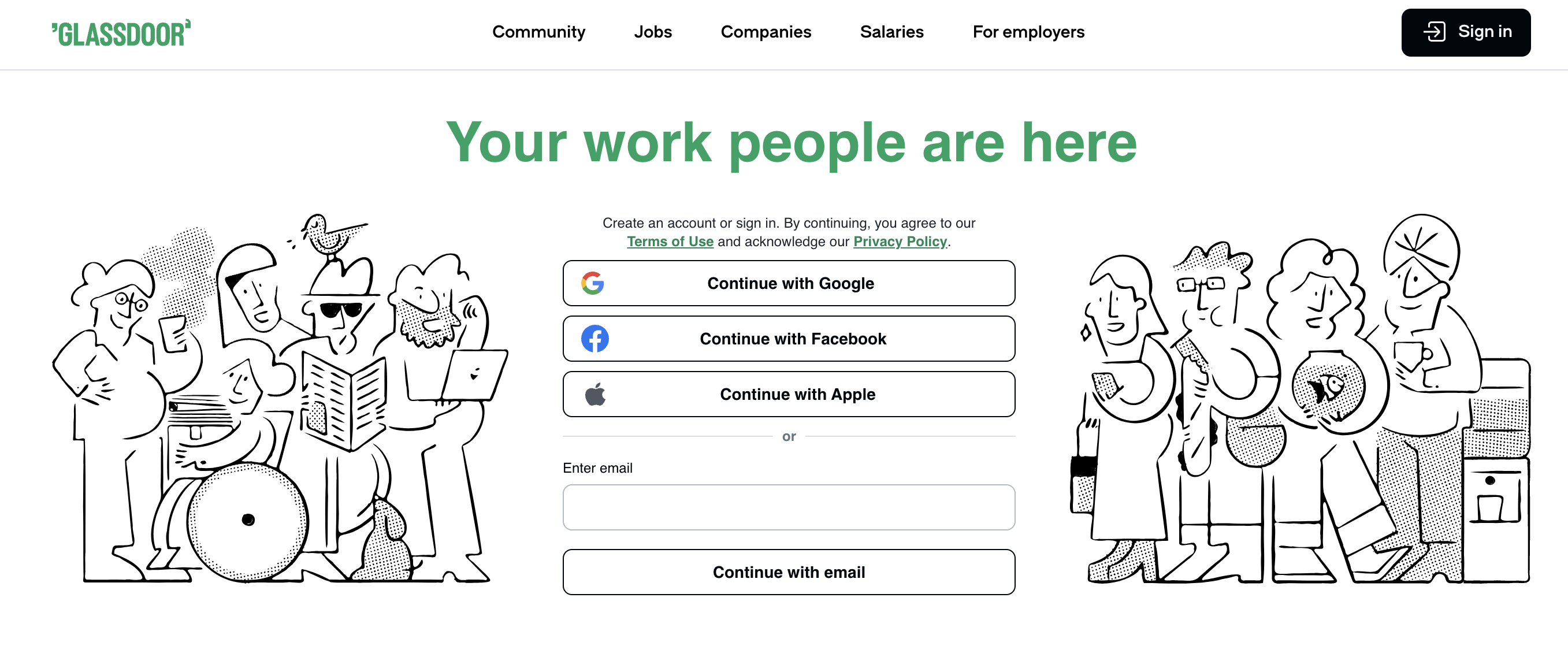
For startup environments, AngelList is a great choice to find candidates interested in innovative company cultures. Dice caters to tech-focused roles, providing access to a large pool of technical talent. Monster offers tools for resume searches and employer branding, making it suitable for a wide range of job types. When hiring, consider using cognitive ability tests to evaluate candidates' analytical skills, which are crucial for Pricing Analysts.
How to screen Pricing Analyst resumes?
Resume screening is a necessary step in hiring the right Pricing Analyst. It helps narrow down the pool of candidates by filtering out those who don't meet the basic requirements, saving time and resources in the recruitment process.
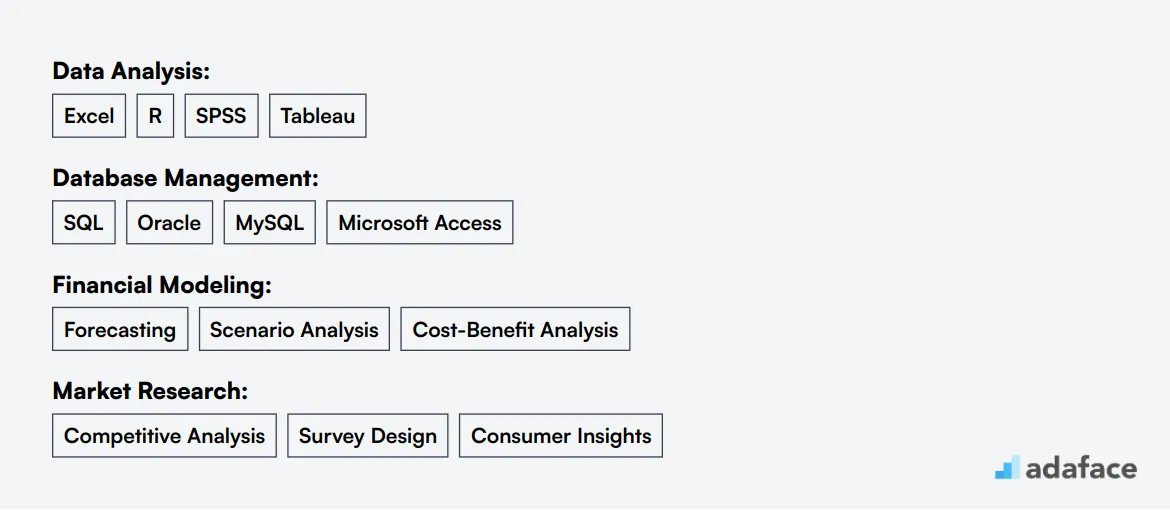
To effectively screen resumes manually, it's important to know the key skills and qualifications to look for. These include a Bachelor's degree in finance, experience in pricing or financial analysis, strong analytical skills, and proficiency in Excel. Keep an eye out for these terms when reviewing resumes to ensure you shortlist qualified candidates.
Incorporating AI into your resume screening process can further enhance accuracy and efficiency. Tools powered by large language models can analyze resumes for specific keywords and provide recommendations based on the desired qualifications for the role. This approach can be a game-changer, especially when dealing with a high volume of applications.
Here's a sample prompt to use with AI tools for screening:
TASK: Screen resumes to match job description for Pricing Analyst role
INPUT: Resumes
OUTPUT: For each resume, provide following information:
- Email id
- Name
- Matching keywords
- Score (out of 10 based on keywords matched)
- Recommendation (detailed recommendation of whether to shortlist this candidate or not)
- Shortlist (Yes, No or Maybe)
RULES:
- If you are unsure about a candidate's fit, put the candidate as Maybe instead of No
- Keep recommendation crisp and to the point.
KEYWORDS DATA:
- Data Analysis (Excel, R, SPSS, Tableau)
- Database Management (SQL, Oracle, MySQL, Microsoft Access)
- Financial Modeling (Forecasting, Scenario Analysis, Cost-Benefit Analysis)
- Market Research (Competitive Analysis, Survey Design, Consumer Insights)
Recommended Skills Tests to Screen Pricing Analysts
When you're hiring a Pricing Analyst, it's important to assess their skills thoroughly. Skills tests provide a reliable method to objectively evaluate candidates' abilities beyond what's listed on their resume. Here are our recommendations for skills tests to ensure you select the right candidate:
- Financial Analyst Test: This test evaluates a candidate's understanding of financial concepts, which is essential for managing pricing strategies effectively. It's crucial for Pricing Analysts to have a solid grasp of financial analysis to assess profitability and optimize pricing models. Learn more about the Financial Analyst Test.
- Data Analysis Test: Pricing Analysts need to make data-driven decisions, and this test measures a candidate's ability to interpret and analyze large data sets. It's important for ensuring they can identify trends and insights that impact pricing strategies. Explore the Data Analysis Test.
- Excel Test: Excel skills are often a prerequisite for Pricing Analysts. This test assesses candidates' proficiency in using Excel for data manipulation and financial modeling, which are frequent tasks in pricing analysis. Check the Excel Test.
- Quantitative Aptitude Test: Quantitative skills are key for any analyst role. This test evaluates candidates on their numerical reasoning and problem-solving skills, which are important for developing accurate pricing models. See the Quantitative Aptitude Test.
- Business Math Test: A Pricing Analyst must be comfortable with business math to calculate costs, margins, and pricing structures. This test helps evaluate a candidate's ability to apply mathematical concepts to real-world business scenarios. Explore the Business Math Test.
Recommended Case Study Assignments for Hiring Pricing Analysts
Case study assignments can be a valuable tool in the hiring process, providing deep insights into a candidate's analytical skills and problem-solving approach. However, these assignments can also be lengthy and may deter potential candidates due to the time commitment required. It's important to balance the assessment depth with candidate engagement, ensuring you don’t miss out on capable applicants.
Pricing Strategy Analysis: This case study involves assessing a candidate's ability to develop a pricing strategy for a new product launch. By using real-world data and scenarios, recruiters can evaluate the candidate's understanding of market dynamics and their ability to suggest competitive pricing models. For more on this, explore our Pricing Analyst Job Description.
Data-Driven Forecasting: In this assignment, candidates are tasked with creating sales forecasts using historical data. This tests their proficiency in data analysis and accuracy in predicting sales trends. It's an excellent way to gauge both analytical skills and attention to detail.
Competitive Analysis: This case study requires candidates to analyze a company’s pricing strategy against its competitors. The focus here is on strategic thinking and the ability to provide actionable insights that can align with business goals.
What is the Cost of Hiring a Pricing Analyst?
Hiring a Pricing Analyst typically costs between $49,519 and $114,870 in the United States, with an average salary of approximately $79,596. Costs can vary greatly depending on the candidate's location and experience level. For example, cities like Jacksonville, FL offer higher salaries compared to places like Houston, TX.
Pricing Analyst Salary in the United States
The average salary for a Pricing Analyst in the United States is approximately $79,596. Salaries can vary significantly by location, with a range from $49,519 to $114,870. For instance, in cities like Jacksonville, FL, the average is about $119,312, while in Houston, TX, it drops to around $72,395.
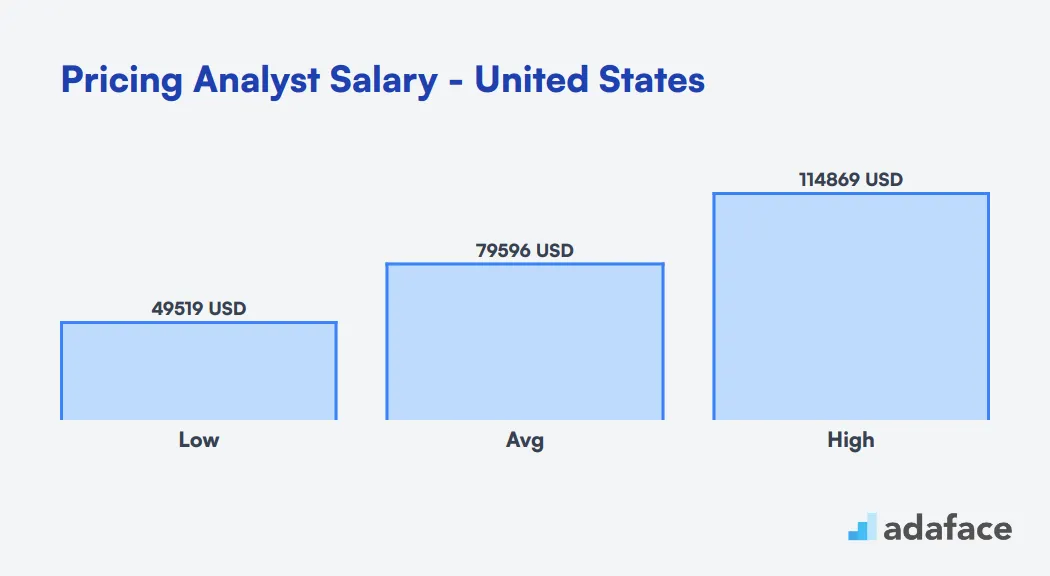
Pricing Analyst Salary in the United Kingdom
The average salary for Pricing Analysts in the United Kingdom ranges from £30,000 to £60,000 per year. Entry-level positions typically start around £25,000, while experienced professionals can earn up to £80,000 or more.
Factors influencing salary include location, industry, company size, and experience level. London-based roles often offer higher salaries due to the higher cost of living.
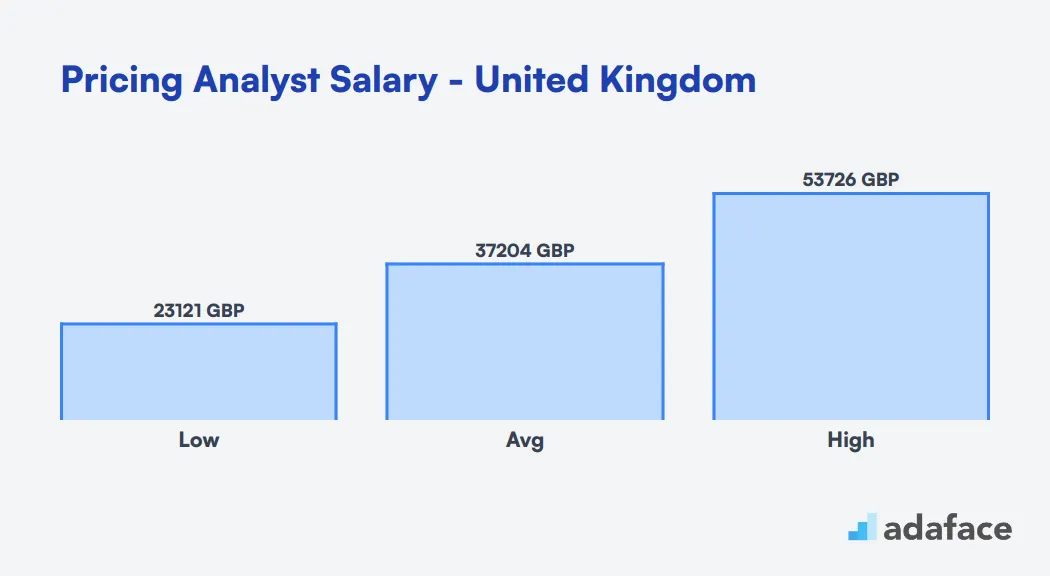
Pricing Analyst Salary in Australia
In Australia, Pricing Analysts earn an average salary of AUD 94,392 per year. The salary range typically falls between AUD 68,840 for entry-level positions and AUD 122,966 for more experienced professionals.
Salaries vary by location, with Sydney and Brisbane offering higher average salaries compared to Melbourne. In Sydney, the average salary is around AUD 95,128, while in Melbourne, it's approximately AUD 88,535.
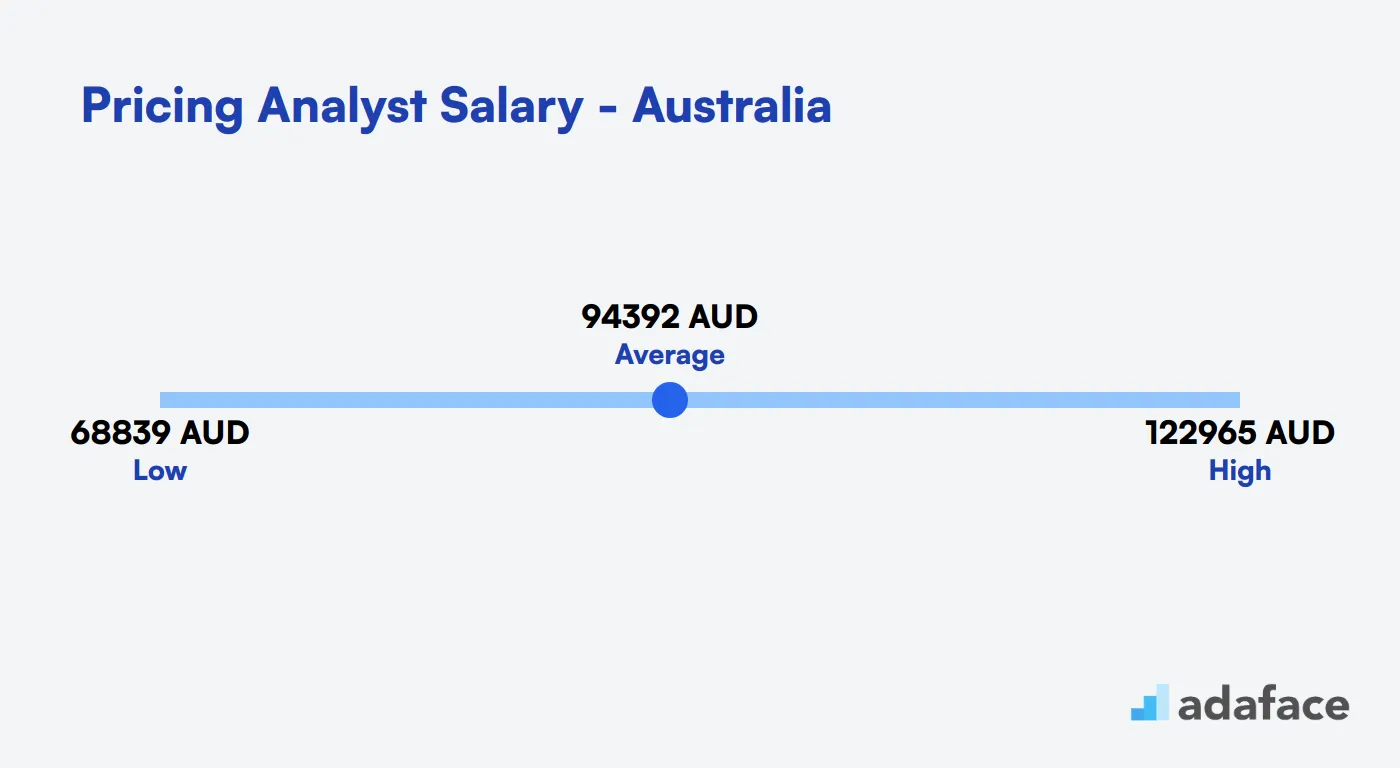
What's the difference between a Pricing Analyst and a Senior Pricing Analyst?
Many recruiters confuse the roles of a Pricing Analyst and a Senior Pricing Analyst due to their similar job titles. However, these positions differ significantly in terms of experience, responsibilities, and required skill sets.
A Pricing Analyst typically holds a bachelor's degree and has 1-3 years of experience. They perform basic to intermediate analyses, assist with market research, and communicate within internal teams. Their focus is primarily on implementing pricing strategies under the guidance of senior staff.
In contrast, a Senior Pricing Analyst usually possesses a master's degree or MBA and has more than 5 years of experience. They bring advanced analytical skills to the table and are responsible for developing comprehensive pricing strategies. This role involves team leadership, managing external stakeholders, and leading complex market analyses, making it a more strategic position in the organization.
| Pricing Analyst | Senior Pricing Analyst | |
|---|---|---|
| Education Level | Bachelor's degree | Master's degree or MBA |
| Years of Experience | 1-3 years | 5+ years |
| Analytical Skills | Basic to intermediate | Advanced |
| Leadership Responsibilities | Limited | Team leadership and mentoring |
| Strategic Input | Implements strategies | Develops pricing strategies |
| Software Proficiency | Excel, basic statistical tools | Advanced analytics software, BI tools |
| Market Research | Assists with research | Leads complex market analysis |
| Stakeholder Management | Internal team communication | Cross-functional leadership, external stakeholders |
What are the ranks of Pricing Analysts?
Pricing Analysts play a key role in any company, but people often confuse their rank and responsibilities with other financial roles. Understanding the hierarchy of Pricing Analysts helps in clarifying duties and expectations.
- Junior Pricing Analyst: This entry-level position involves assisting in data collection and analysis to determine pricing strategies. They work under the guidance of senior analysts or managers to learn the ropes of the industry.
- Pricing Analyst: As a mid-level role, a Pricing Analyst is responsible for analyzing market data to establish competitive pricing. They collaborate with other departments to develop pricing models that align with business objectives. For more on what this role involves, check out the Pricing Analyst Job Description.
- Senior Pricing Analyst: This senior-level position requires a deep understanding of market trends and advanced data analysis skills. A Senior Pricing Analyst leads projects, mentors junior staff, and provides insights to refine pricing strategies further.
- Pricing Manager: At the managerial level, a Pricing Manager oversees the pricing strategy for the entire company. They coordinate with different teams to ensure pricing policies are aligned with the company’s financial goals and market positioning.
Hire the Best Pricing Analysts for Your Team
We've covered the importance of pricing analysts, the hiring process, key skills to look for, and how to write effective job descriptions. We've also discussed where to find candidates, how to screen resumes, and useful skills tests and case studies for evaluation.
If there's one key takeaway, it's the value of using well-crafted job descriptions and targeted skills assessments to make your hiring process more accurate. Consider using a financial analyst test or data analysis assessment to gauge candidates' capabilities objectively. Remember, the right pricing analyst can significantly impact your company's profitability and market position.
Financial Analyst Test
FAQs
Look for candidates with a degree in economics, finance, or a related field. Key skills include data analysis, statistical modeling, market research, and proficiency in tools like Excel and SQL. Experience with pricing software and a strong understanding of pricing strategies are also valuable.
Use a combination of methods including data analysis tests, case studies, and situational interview questions. Ask candidates to analyze sample pricing scenarios or present a pricing strategy for a hypothetical product launch.
Some effective questions include: 'How would you approach pricing a new product?', 'Describe a time when you successfully optimized pricing for increased profitability', and 'How do you stay updated on market trends and competitor pricing?' For more ideas, check out our pricing analyst interview questions guide.
While industry experience can be beneficial, it's not always necessary. Strong analytical skills, adaptability, and a solid understanding of pricing principles are often more valuable. A candidate from a different industry may bring fresh perspectives to your pricing strategies.
Soft skills are crucial for a pricing analyst. Look for candidates with excellent communication skills, as they'll need to explain complex data to stakeholders. Problem-solving abilities, attention to detail, and the capacity to work collaboratively with sales and marketing teams are also important.
A pricing analyst should be proficient in Excel, statistical software like R or Python, and data visualization tools. Familiarity with SQL for database querying is often required. Knowledge of specific pricing software used in your industry can be a plus but can also be taught on the job.
Besides technical skills, assess cultural fit by involving team members in the interview process. Look for candidates who demonstrate adaptability, a collaborative spirit, and alignment with your company's values. Consider using personality assessments or team-based case studies to gauge how well they might integrate with your existing dynamics.

40 min skill tests.
No trick questions.
Accurate shortlisting.
We make it easy for you to find the best candidates in your pipeline with a 40 min skills test.
Try for freeRelated posts
Free resources



